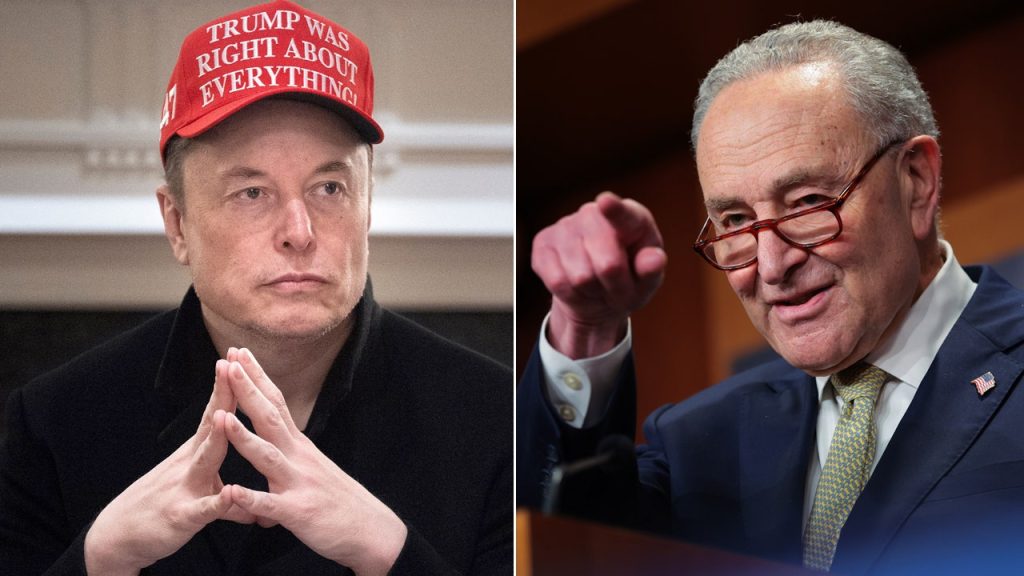In a recent confrontation on social media, business mogul Elon Musk accused Senate Minority Leader Chuck Schumer of potentially profiting from government fraud. This remark came in response to Schumer’s criticisms of Musk’s initiatives aimed at addressing waste and abuse within government programs. Musk’s claim elicited a strong rebuttal from Schumer, who suggested that Musk’s actions are detrimental to crucial social services like Social Security, Medicare, and Medicaid. The exchange highlights an intensifying rivalry between the two figures over governmental efficiency and social safety nets.
| Article Subheadings |
|---|
| 1) Musk’s Accusation of Government Fraud |
| 2) Schumer’s Defense against Allegations |
| 3) The Role of DOGE and its Objectives |
| 4) Implications for Social Services |
| 5) Future of Musk and Schumer’s Discourse |
Musk’s Accusation of Government Fraud
Elon Musk recently took to social media to criticize Senate Minority Leader Chuck Schumer, suggesting that Schumer could be benefiting from fraudulent government practices. In his post, Musk implied that Schumer’s interactions with the government might undermine efforts directed at eradicating waste. The comment made headlines early Tuesday morning, igniting further discussions about the accountability of public officials. Musk has been a vocal proponent of the Department of Government Efficiency (DOGE), which aims to identify and reduce waste and fraud across various government sectors.
Schumer’s Defense against Allegations
In response to Musk’s insinuations, Schumer firmly rejected the accusations, labeling Musk’s statement as “another Elon lie.” He argued that it is Musk’s own actions—specifically his financial gains from government contracts—that are suspicious. Schumer emphasized the gravity of the claims, asserting that anyone challenging Musk is unjustly painted as fraudulent. The interplay of accusations reflects the broader clash between political agendas and private sector influences on government policies.
The Role of DOGE and its Objectives
The Department of Government Efficiency (DOGE) has been established with the mission to audit and reform government spending. With Musk at the helm of this initiative, the program seeks to expose inefficiencies and promote transparency within the federal government. Musk argues that exposing fraudulent activities is essential for safeguarding public funds and ensuring that programs designed to support citizens, such as Social Security, remain intact and effective. This effort has drawn both support and criticism from various political factions, illustrating the complexities involved in addressing systematic governmental issues.
Implications for Social Services
The ongoing spat has brought renewed attention to critical social services like Social Security, Medicare, and Medicaid—programs that are under constant scrutiny and debate in Congress. Schumer has accused Musk of undermining these essential services, claiming that Musk’s reform initiatives could lead to reduced benefits for millions of Americans. Schumer’s assertion stems from an underlying belief that Musk’s agenda may prioritize profit over the welfare of citizens relying on governmental support. The clash between the two could ultimately have significant implications not only for policy-making but also for public trust in government programs.
Future of Musk and Schumer’s Discourse
As the exchanges between Musk and Schumer continue, the public can expect heightened political rhetoric and debates concerning government efficiency. Musk’s controversial statements and Schumer’s robust defenses represent a microcosm of the larger ideological battle over the role of government in personal and economic affairs. Given Musk’s high-profile status and Schumer’s significant political influence, their ongoing dialogue may shape public sentiment around crucial issues, influencing policy and governance moving forward.
| No. | Key Points |
|---|---|
| 1 | Elon Musk accused Senate Minority Leader Chuck Schumer of potential involvement in government fraud. |
| 2 | Schumer responded by labeling Musk’s claims as misinformation and defended his position. |
| 3 | DOGE aims to uncover and mitigate wasteful spending in various federal programs. |
| 4 | The dispute may affect public perception of essential services like Social Security and Medicare. |
| 5 | Future interactions between Musk and Schumer may influence policy discussions and reforms. |
Summary
The back-and-forth between Elon Musk and Chuck Schumer encapsulates a significant narrative in current political discourse about government efficiency and accountability. As both figures navigate their responsibilities in the public eye, the reactions generated by their statements will likely resonate with the public and stakeholders alike. This rivalry showcases the potential for personal and political agendas to collide in the realm of public service and inform the future of legislation impacting critical social programs.
Frequently Asked Questions
Question: What is the Department of Government Efficiency (DOGE)?
The Department of Government Efficiency (DOGE) seeks to identify and mitigate waste, fraud, and abuse within federal government programs, promoting greater accountability in public spending.
Question: How did Chuck Schumer respond to Elon Musk’s accusations?
Schumer rejected Musk’s claims as lies, emphasizing that he has been a staunch critic of Musk’s actions, which he believes harm essential social services.
Question: Why are Social Security benefits becoming a central issue in this debate?
Social Security benefits are central to this debate due to concerns that initiatives aimed at reducing government waste may inadvertently lead to reductions in services and support essential for many Americans.


